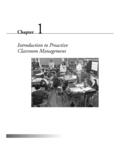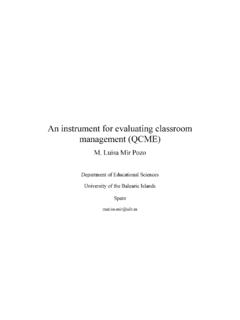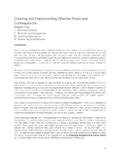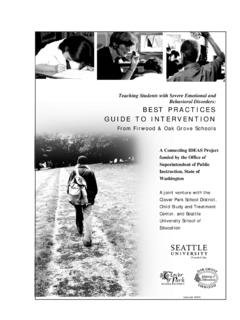Transcription of TIP Behaviour Management - education.gov.pg
1 Teacher In-Service Behaviour Management Facilitator s Manual Improving student Behaviour and welfare Department of Education Teacher Education Division 1st Edition, 2009 For school and cluster facilitators Primary, secondary and TVET institutions Department of Education Behaviour Management TIP Facilitator s Manual for Behaviour Management 2 Department of Education Teacher In-service Behaviour Management Facilitator s Manual For school and cluster facilitators Primary, secondary and TVET institutions First Edition funded by the Department of Education and the Education Capacity Building Program (AusAID) DEPARTMENT OF EDUCATION TIP Facilitator s Manual for Behaviour Management 3 Issued free to schools and teacher education providers in Papua New Guinea by the Department of Education.
2 Published in 2009 by Department of Education, Papua New Guinea Copyright 2009, Department Education, Papua New Guinea ISBN 978-9980-86-277-3 All rights reserved. Acknowledgements These materials were developed in one participatory workshop at Port Moresby Business College beginning of September materials were designed and written by guidance officers, teacher training lecturers (PNGEI), standards officers, CDAD and ECBP officers. Guidance Branch Mr. Gabriel Meapa , Mr. Ben Malari, Mrs. Lepapa Kopi, Mr. Kevin Marimyas, Mrs. Lucy Uri, Sipendi, Mr. Bayasa Sonea, and Mr. Allan Jim. PNG Education Institute Mr. Kali Wavala Standards Wing Mr. Joe Moide Curriculum Development and Assessment Division Avosa Education Capacity Building Project Mr. Philip So on, Ms.
3 Lara Andrews, Vele Kila and Mrs. Margaret Maru Development of these materials wasmade possible through the Support of the Education Capacity Building program of AusAID. Teachers and schools in Papua New Guinea have permission to use, share and adapt these materials. Guidance Branch Standards and Guidance Division Department of Education PNGEI, P O Box 446 Waigani (t) 325 7222 ext 488 TIP Facilitator s Manual for Behaviour Management 4 Contents Secretary s How to use this Rationale and aims of the Session Unit 1: Behaviour Session What is Behaviour Management ?..11 Session The Behaviour Management Unit 2: Strategies to Promote Positive Behaviour and Respond to Poor Session Proactive Strategies and Interventions: Peer Education, Conflict Resolution, Teaching Life Session Stop!
4 Think! Do!..24 Session Assertive Session Rewards & Session Suspension and Session Use of School Session Working with Parents and Other Unit 3: Responding to Student Session : Dealing with Session Managing Critical Incidents and Session Child Unit 4: Implementing Behaviour Management in Your Session Developing a School Behaviour Management Session Integrating Behaviour Management into Glossary and Documents and resources for further Contacts and approved TIP Facilitator s Manual for Behaviour Management 5 Secretary s Message The Department of Education is committed to promoting positive student Behaviour in our schools. All members of the school community are now accountable to the principles and responsibilities set out in the Behaviour Management Policy for the National Education System of Papua New Guinea (2009).
5 To complement the launch of this policy, a number of strategies are being used by the Department of Education to ensure effective implementation of Behaviour Management across our schools. One such strategy includes the training of teachers and head teachers in Behaviour Management . Behaviour Management skills are core components of a teachers professional skills and are now part in both pre-service and in-service training Teachers and head teachers play a central role in promoting positive student Behaviour in our schools and need support to continue to respond to the increasing numbers of students and student issues in our schools. Dealing with issues that affect student Behaviour , such as bullying, drug and alcohol use, family breakdown, child abuse, death of family members is common work for teachers.
6 While most students behave well in schools, we need to assist teachers to learn skills and strategies to intervene when there is poor Behaviour so that our students have a chance to learn better ways to behave and get the very best out of their education. Every school will be required to develop a school Behaviour Management policy. This will become part of their school learning improvement plan (SLIP). This manual has been produced as in-service training for teachers, including, primary, secondary and TVET institutions. This training is designed to help teachers build on their existing knowledge and skills about working with students. This training includes sessions on how teachers can promote positive Behaviour in schools, strategies for responding effectively to poor Behaviour and dealing with common student issues.
7 This manual could be used by in-service cluster groups under teacher in-service program (TIP) or by schools independently. I approve these materials for use in school in-service sessions and encourage all teachers to read, adapt, share and use the training sessions to improve their own skills and knowledge. DR JOSEPH PAGELIO Secretary for Education TIP Facilitator s Manual for Behaviour Management 6 introduction Behaviour Management is a whole school approach to creating an environment to promote positive Behaviour and reduce opportunities for poor Behaviour . Behaviour Management is also about responding to poor Behaviour in a way that not only allows students to take responsibility for their Behaviour but provides them with an opportunity to learn and change.
8 Behaviour Management recognises that sometimes there are underlying causes for poor student Behaviour , like lack of supervision and parental guidance, family and relationship problems, peer pressure, illness and death amongst family members, drug and alcohol abuse and economic hardship that students need help to deal with. A whole school approach to Behaviour Management includes student-centred school rules, fair discipline processes, classroom Management , strategies to work with parents and community, praise and reward systems, participation, effective school Management , counselling and support and professionally trained teachers. The Behaviour Management Policy for the National Education System of Papua New Guinea (2009) is based on nine core principles and sets out the responsibilities for key stakeholders, including students, teachers and head teachers.
9 The policy sets the standards for the ways in which all schools are to approach Behaviour Management . In addition, all schools are now required to develop their own school Behaviour Management policy in line with the national policy. School Behaviour Management policies will be integrated into school learning improvement plans (SLIPs) and monitored by guidance and standard officers. Policies must be developed in a participatory way and in consultation with all members of the school community. This training is designed to help teachers better understand concepts and strategies involved in a whole school approach to Behaviour Management . The training will help teachers to reflect on effective and ineffective ways to deal with student Behaviour and think about how they improve their teaching and classroom environments to enhance positive student Behaviour .
10 The training should assist teachers and head teacher in developing and implementing their school policies by giving them knowledge and skills in effective Behaviour Management strategies. This course will be linked to the School Learning Improvement Plans (SLIPs) and the implementation of the reform curriculum. This course builds on content and skills from: Classroom Management Health HIV/AIDS & Reproductive Health Gender Equity or Child Friendly Schools Child Development Life skills Personal Development How to use this manual. Inside the session, there are a series of case studies about common student issues and behaviours . Many of these are real examples of issues faced by teachers and school based counsellors. TIP Facilitator s Manual for Behaviour Management 7 There are fourteen sessions broken into four units in this in-service manual.















